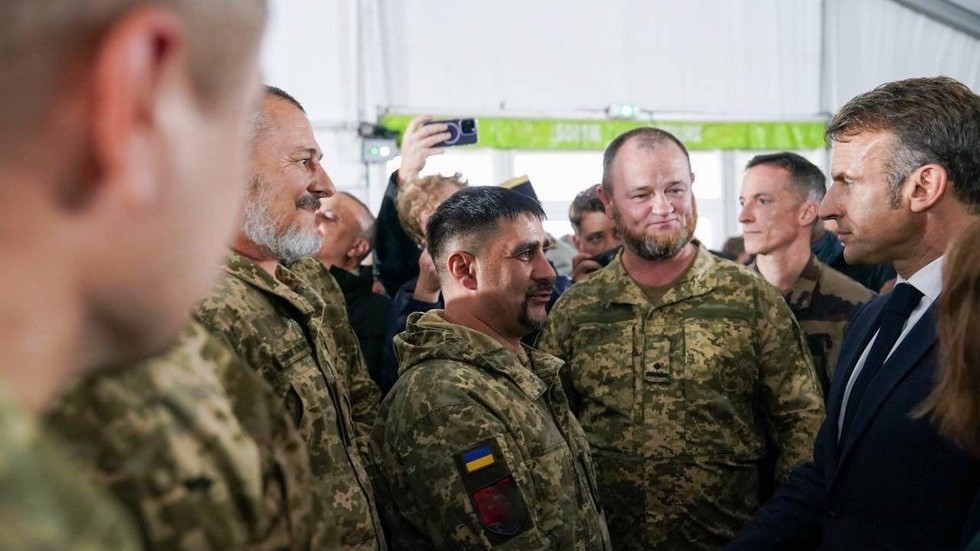President Emmanuel Macron has recently highlighted the ongoing military instruction program in northeastern France designed to support Ukrainian forces in their conflict against Russia. This initiative involves the training of a 2,300-soldier Ukrainian brigade, known as ‘Anne of Kiev,’ organized by the French military in the Grand Est region. Macron reinforced the program’s importance during his visit to the training site, where he and Defense Minister Sébastien Lecornu observed the preparation of Ukrainian troops. As part of this initiative, approximately 1,500 French military personnel are directly engaged in training operations that aim to bolster Ukraine’s military capabilities.
The forthcoming deployment of the brigade reflects France’s commitment to equip Ukrainian soldiers with vital military resources. Upon completion of their training, the Ukrainian troops will receive an arsenal that includes 128 armored vehicles, 18 Caesar artillery guns, 8 AMX-10 RC armored fighting vehicles, 10 trucks, and 20 Milan anti-tank guided missile systems. This equipment is intended to enhance the brigade’s operational effectiveness on the battlefield, underscoring France’s strategic partnership with Ukraine amidst the ongoing conflict. The brigade’s designation, ‘Anne of Kiev,’ pays homage to the historical ties between France and Ukraine, stemming from the marriage of Anne, daughter of Prince Yaroslav the Wise, to King Henry I of France in the 11th century.
In parallel to this training program, the French Air Force is preparing to instruct Ukrainian pilots and mechanics on operating Mirage 2000 fighter jets. Plans are underway to potentially transfer some of these jets to Ukraine as early as next year, further deepening military cooperation between the two nations. Macron’s engagement in this endeavor demonstrates a broader commitment to solidifying military support for Ukraine in response to Russia’s actions. The training not only equips Ukrainian forces with necessary skills but also serves as a gesture of solidarity from France and other NATO allies in the fight against perceived Russian aggression.
Additionally, Macron has called on NATO allies to consider the possibility of deploying their own forces to Ukraine, although this suggestion has met with resistance from other Western countries. Such discussions reflect a contentious ongoing debate about the level of military involvement and support for Ukraine in its defense against Russian incursions. Macron aims to retain a level of ambiguity about how far NATO might go in backing Ukraine, presumably to maintain strategic leverage over Russia’s decisions. This balancing act illustrates the complex geopolitical dynamics at play as Western leaders navigate their responses to the conflict while ensuring the safety of their own nations.
The situation on the ground for Ukrainian forces remains precarious, as President Volodymyr Zelensky continues to tour European nations seeking assistance for his ‘victory plan.’ His recent visit to France coincided with preparations for a crucial gathering of foreign weapons supporters at the US Air Base in Ramstein, Germany. However, the event faced postponement when US President Joe Biden opted to focus on domestic challenges, specifically responding to Hurricane Milton. These developments highlight the ongoing struggle for Ukraine to maintain a unified front in garnering international support while dealing with unfavorable circumstances on the battlefield.
In recent months, Ukraine has experienced significant setbacks, particularly following the choice to deploy elite troops for territorial gains in Russia’s Kursk Region. The results of these operations have culminated in a major counteroffensive by Russian forces, which has been characterized by Moscow as a reaction to a conflict instigated by the United States. Russian officials claim that the Ukrainian military is being exploited as “cannon fodder” in this proxy war, illustrating narrative tensions that frame the conflict in divergent ways on both sides. Amidst these complex developments, the strategic military cooperation between Ukraine and its Western allies, particularly France, remains a focal point in ongoing discussions about defense and sovereignty in the face of Russian aggression.

